




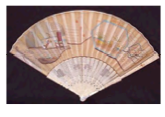
SNUFF and the FAN: THE SPECTATOR
GAME OF OMBRE

ORIGINAL TEXTS:

MORE LINKS

ELIOT’S PARODY

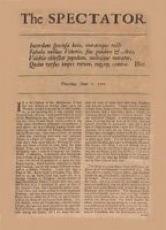

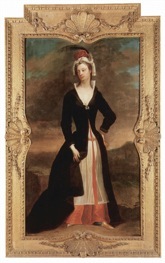
The following lines were adapted from actual writings in pamphlets or books, quoted in Bernsten’s Book. They would be included as dialog in the opera as staged.
MISC LINES
[as Lords are being served coffee, same music as "that was the merry flutter"]
PLUME (spoken)
You know of course that the great anatomist, Dr. Thomas Willis observed that Coffee makes men paralytic and so slackens the sinews and nerves that they become unfit for those sports and excercises of the bed that are necessary to the recreations of their wives. In Persia the wives do serve it in order to avoid the inconveniences of having many children. [LORDS refrain from having their coffee]
FIRST LORD (spoken)
And the famous Dr. Duncan says that the most mischievous quality of coffee is the heat it occasions by its many sharp, subtile, and volatile parts, whereby it chiefly threatens the liver. [LORDS refrain from having their coffee]
SECOND LORD (spoken)
No, no, that is all completely false! The illustrious Dr. Richard Bradley of the Royal Society has established beyond a doubt that Coffee is only harmful to those who have Vapours, Melancholy or hot brains. Coffee is very beneficial for those with cold and moist constitutions. It is known to cure Consumptions, Swooning fits, Migraine, Vertigo, Lethargy, and the Rickets. It helps digestion and gives life and gaity to the spirits.
I thought as much myself! [LORDS have their coffee]
1651: London gets its first coffee house. Demand and damnation come with equal fervor.
1668: Edward Llyod's coffee house opens. It attracts traders and maritime insurers and eventually makes the switch from dealing coffee to dealing insurance. Lloyd's of London is born.
1675: Charles II tries to ban coffee houses, thinking them cesspools of treasonous conversation. He recants his edict almost immediately in response to the outcry of his caffeine-addicted subjects.
1698: At Jonathan's coffee house in Change Alley, John Castaing puts up a list of stock and commodity prices. It's the large and loud precursor to the modern Stock Exchange in London.
1700: The number of coffee houses in the capital has swelled to 3,000. Early in the seventeenth century Pope Clement VIII, facing calls to ban the infidel brew, had decided to grant it Papal approval instead. Presently, coffee's spell has been cast on London as well and the nay saying is being drowned out.
1700s: Coffee houses become centres of culture and learning, earning the nickname 'Penny Universities'. Lectures and demonstrations on astronomy and math and the daily spreading of news make the coffee house a necessary stop for anyone seeking knowledge. Some credit coffee with sparking The Enlightenment by encouraging criticism and discourse.
COFFEE, SEX & HEALTH
A History of Anti-Coffee
Crusaders and Sexual Hysteria
Ian Bersten
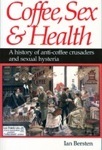
COFFEE HOUSES
A sketch of The Grecian Coffee-House of the 18th century, near St. Paul's Cathedral in London. This is the coffee house most frequented by scientists, classical scholars, and some literary men. The Royal Society frequently met here, with Isaac Newton and Edmund Halley included, and Oliver Goldsmith.
The Coffee Scene parodies the Epic Feast which might last for days in the Iliad. Pope's description of the “feast” is appropriately grandiose for its mock-heroic nature, but the language is genuine in its visual sumptuousness, and typical in its irony.
“For lo! the Board with Cups and Spoons is crown'd,
The Berries crackle, and the Mill turns round.
From silver Spouts the grateful Liquors glide,
While China's Earth receives the smoking Tyde”
“Coffee makes the Politician wise,
And see through all things with his half-shut Eyes”
In the climactic scene where the Baron snips the Lock, he is acted upon by forces superior to his own - coffee.
“The Vapours, rising to his steaming Brain
Breathe Stratagems, the radiant Lock to gain!
See how the baron draws with tempting Grace
A two-edg'd Weapon from his shining Case;
So when to Mischief Mortals bend their Will,
How soon they find fit Instruments of Ill
Ah cease rash Youth! desist!”


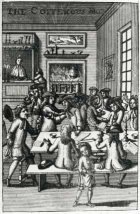
Bach's "Coffee" Cantata was first performed by his Collegium Musicum at Zimmermann's Coffee House in Leipzig. Bach scholars argue about the date, but the first performance occurred some summer evening between 1732 and 1737
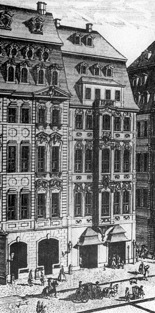
Coffee Houses often became specialized in business dealings or in topics of intellectual discourse.
Some Coffee Houses were also brothels, and so were generally thought to be immoral. Respectable women did not frequent them.
Detail of Tom King's Coffee House from Four Times of the Day
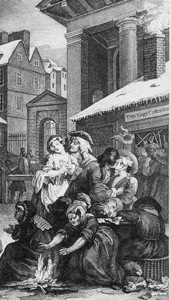
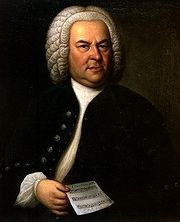


The Coffee Scene
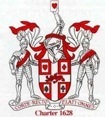
Additional lines on Coffee were taken from this delightful book.
